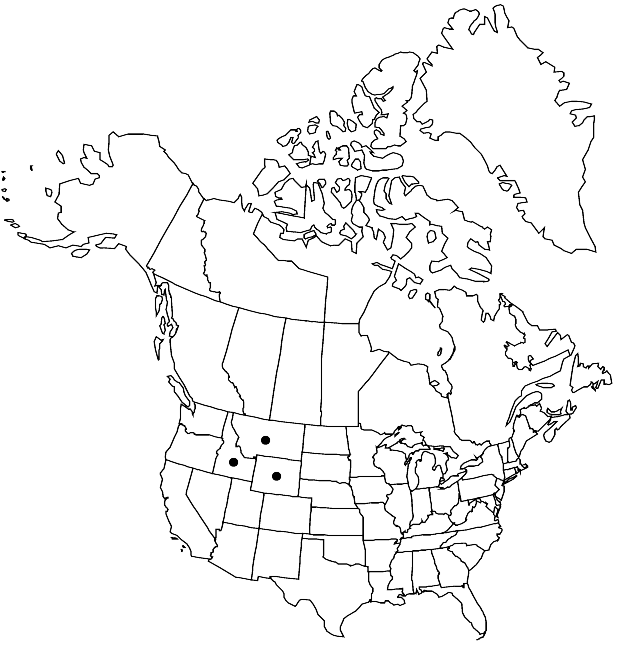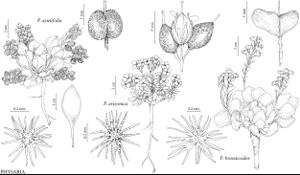Difference between revisions of "Physaria carinata"
Novon 12: 322. 2002.
FNA>Volume Importer |
imported>Volume Importer |
||
| Line 26: | Line 26: | ||
-->{{Treatment/Body | -->{{Treatment/Body | ||
| − | |distribution= | + | |distribution=Idaho;Mont.;Wyo. |
|discussion=<p>Subspecies 3 (3 in the flora).</p><!-- | |discussion=<p>Subspecies 3 (3 in the flora).</p><!-- | ||
--><p>Differences in fruit morphology become blurred and the three subspecies are often indistinguishable where their ranges meet near the intersection of Idaho, Montana, and Wyoming.</p> | --><p>Differences in fruit morphology become blurred and the three subspecies are often indistinguishable where their ranges meet near the intersection of Idaho, Montana, and Wyoming.</p> | ||
| Line 65: | Line 65: | ||
|basionyms=Lesquerella carinata | |basionyms=Lesquerella carinata | ||
|family=Brassicaceae | |family=Brassicaceae | ||
| − | |distribution= | + | |distribution=Idaho;Mont.;Wyo. |
|reference=None | |reference=None | ||
|publication title=Novon | |publication title=Novon | ||
|publication year=2002 | |publication year=2002 | ||
|special status= | |special status= | ||
| − | |source xml=https:// | + | |source xml=https://bibilujan@bitbucket.org/aafc-mbb/fna-data-curation.git/src/bb6b7e3a7de7d3b7888a1ad48c7fd8f5c722d8d6/coarse_grained_fna_xml/V7/V7_1028.xml |
|tribe=Brassicaceae tribe Physarieae | |tribe=Brassicaceae tribe Physarieae | ||
|genus=Physaria | |genus=Physaria | ||
Revision as of 23:51, 27 May 2020
Perennials; caudex simple, (often enlarged by persistent leaf bases); densely pubescent, trichomes (sessile or short-stalked), rays furcate or bifurcate, (nearly smooth to finely tuberculate). Stems simple from base, decumbent, (occasionally few-branched), 0.5–1.5(–2) dm. Basal leaves: blade elliptic to broadly obovate, triangular, rhombic, or round, 1.5–3(–4) cm, margins often sinuate or shallowly lobed. Cauline leaves (sessile or shortly petiolate); blade elliptic to oblanceolate to obovate, 0.5–1.5 cm, (base narrowed to petiole), margins entire. Racemes compact to loose. Fruiting pedicels (ascending or divaricate-spreading, straight to loosely sigmoid or curved), 4–10 mm. Flowers: sepals oblong to broadly elliptic, 4–7.5 mm, (lateral pair saccate or not); petals spatulate, 7.5–10 mm. Fruits (sessile or substipitate), elliptic, suborbicular, or oblong, strongly compressed (angustiseptate), 5–9 mm, (rounded to sharply keeled on 1 side, edges ± keeled); valves: (margins covering replum edges or not), usually pubescent throughout or, rarely, glabrous inside; ovules (4–)8–14(–16) per ovary; style 2–4.5(–5) mm. Seeds slightly flattened.
Distribution

Idaho, Mont., Wyo.
Discussion
Subspecies 3 (3 in the flora).
Differences in fruit morphology become blurred and the three subspecies are often indistinguishable where their ranges meet near the intersection of Idaho, Montana, and Wyoming.
Selected References
None.
Lower Taxa
Key
| 1 | Fruits elliptic, not keeled, valve margins (thin, rounded), not covering replum edges. | Physaria carinata subsp. paysonii |
| 1 | Fruits elliptic, suborbicular, or broadly oblong, keeled on one side, valve margins covering replum edges | > 2 |
| 2 | Fruits elliptic, bases narrow-rounded to acute, apices ± acute. | Physaria carinata subsp. carinata |
| 2 | Fruits suborbicular to elliptic or broadly oblong, bases and apices rounded. | Physaria carinata subsp. pulchella |
